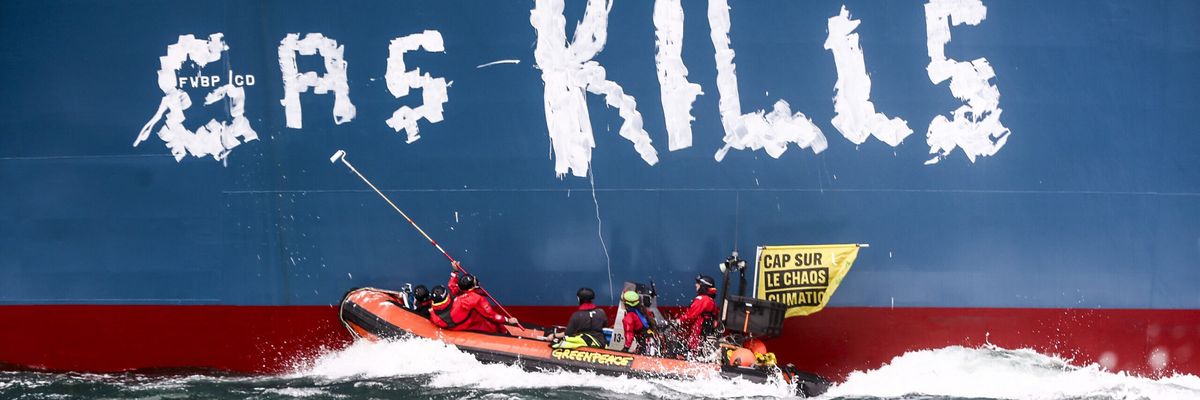As part of the Global Fight to End Fossil Fuels, activists from Greenpeace France attempted to block a new TotalEnergies liquefied natural gas terminal from entering the port of Le Havre Monday morning.
Kayakers paddled between the port entrance and the tanker carrying the terminal—the
Cape Ann—and wrote "Gas kills" in white paint along its side, Reuters reported.
"This LNG terminal is yet another blatant example of 'shock doctrine,' where gas operators shifted their public messaging and lobbying from 'energy transition' to 'energy security' and cynically used the opportunity after the energy supply concerns triggered by the Russian invasion of Ukraine to frighten governments into massive, unneeded investment into and expansion of fossil gas imports and infrastructure," Greenpeace France oil, transport, and ocean campaigner Hélène Bourges
said in a statement.
The LNG floating storage regasification unit did arrive at the port in Western France Monday morning, TotalEnergies told
Reuters.
But the Greenpeace activists argue its arrival contradicts French President Emmanuel Macron's 2022 promise to
make France the first major nation to abandon the fossil fuels driving the climate emergency. What's more, the gas is mostly U.S. shale gas, obtained by fracking—a method banned in France because of the harm it does to the global climate and the health and environment of local communities.
The activists in kayaks carried banners reading "Total: shale dealer," "Macron: shale dealer," and "End Fossil Crimes."
Members of Scientists in Rebellion also came to Le Havre to support the action.
"This LNG terminal is a sham that responds neither to the crisis nor to energy sovereignty and pushes us into a scenario of climate chaos," the group
wrote on X, formerly Twitter.
Greenpeace challenged the narrative that increased LNG is necessary to help France and the rest of Europe meet their energy needs in the wake of Russia's invasion of Ukraine. In a report copublished in June with Disclose, Greenpeace France
pointed out that the country's existing LNG terminals did not use their maximum capacity in 2022 and were underutilized during the first half of 2023.
"If France really suffered from a gas supply crisis in 2022 that was severe enough to justify the new floating terminal in Le Havre, it's surprising that the capacities of existing terminals, particularly the ones at Dunkerque and Fos Tonkin, were underutilized," the report authors wrote.
"This summer's extreme weather events have highlighted the urgency of moving away from fossil fuels."
Instead, they argued that the LNG increase was the result of lobbying from the oil and gas industry.
"The only beneficiaries of the LNG gas infrastructure in Le Havre are TotalEnergies, the operator of the floating terminal, and its shareholders, whose private interests and gains prevail over climate action and people's health, with the complicit support of the French government that granted an unprecedented legal preferential regime to set up this operation," Bourges said in a statement.
Greenpeace's action followed a summer of deadly
heatwaves, fires, and floods and a global mobilization to end fossil fuels from September 15-17.
"This summer's extreme weather events have highlighted the urgency of moving away from fossil fuels," Greenpeace France
wrote on social media.
The group said it had two demands for Macron: to prevent the new terminal from being used and to kill any other fossil fuel projects under consideration.

